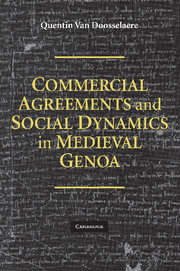Book contents
- Frontmatter
- Contents
- List of Figures
- List of Tables
- Abbreviations
- Acknowledgments
- 1 From Sword into Capital
- 2 Genoa at the Dawn of the Commercial Expansion
- 3 Equity Partnerships for Heterogeneous Ties
- 4 Credit Network for Routinized Merchants
- 5 Insurance Ties for Oligarchic Cohesion
- 6 Conclusion
- Appendix A Sample of Prices and Income
- Appendix B Sample of Long-Distance Trade Participants' Occupations
- Appendix C Commenda Network Graphs
- Appendix D Nodal Degree Distributions of Commenda Networks
- Appendix E List of Top Mercantile Nonaristocratic Families
- Appendix F Partner Selection Probability Model
- Bibliography
- Index
2 - Genoa at the Dawn of the Commercial Expansion
Published online by Cambridge University Press: 31 August 2009
- Frontmatter
- Contents
- List of Figures
- List of Tables
- Abbreviations
- Acknowledgments
- 1 From Sword into Capital
- 2 Genoa at the Dawn of the Commercial Expansion
- 3 Equity Partnerships for Heterogeneous Ties
- 4 Credit Network for Routinized Merchants
- 5 Insurance Ties for Oligarchic Cohesion
- 6 Conclusion
- Appendix A Sample of Prices and Income
- Appendix B Sample of Long-Distance Trade Participants' Occupations
- Appendix C Commenda Network Graphs
- Appendix D Nodal Degree Distributions of Commenda Networks
- Appendix E List of Top Mercantile Nonaristocratic Families
- Appendix F Partner Selection Probability Model
- Bibliography
- Index
Summary
Commercial ties did not appear suddenly and did not change Genoa's social organizations instantaneously. Thus, exact periodicity as such is not critical, but the proper concatenation of Genoa's historical dynamics is crucial in order to understand the transition from a medieval feudal organization to a Renaissance mercantile social structure. This chapter serves as an historical introduction both to the city-state of Genoa and to medieval commerce up until the mid twelfth century, when the Genoese created the oldest surviving notarial cartularies in Europe (Giovanni Scriba, 1155–64). The objective here is not to look for an illusive origin or starting point, but rather to establish a twelfth-century baseline from which to study the development of Genoa throughout the following three centuries, when social encounters became increasingly defined by commercial agreements.
The first section of the chapter traces the beginning of the Genoese Commune at around the time of the First Crusade (1097–99) and confirms the feudal base of its origin (Sieveking 1906; Bach 1955). The purpose is to highlight in the historiography of the city those elements that provide an understanding of its social order as trade began to expand in the twelfth century. I use several primary sources and some of the early notarial records to highlight the role of the feudal elite, and I point to its financial transactions with the young Commune.
- Type
- Chapter
- Information
- Publisher: Cambridge University PressPrint publication year: 2009

